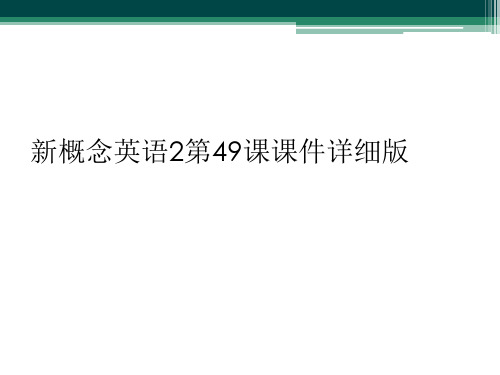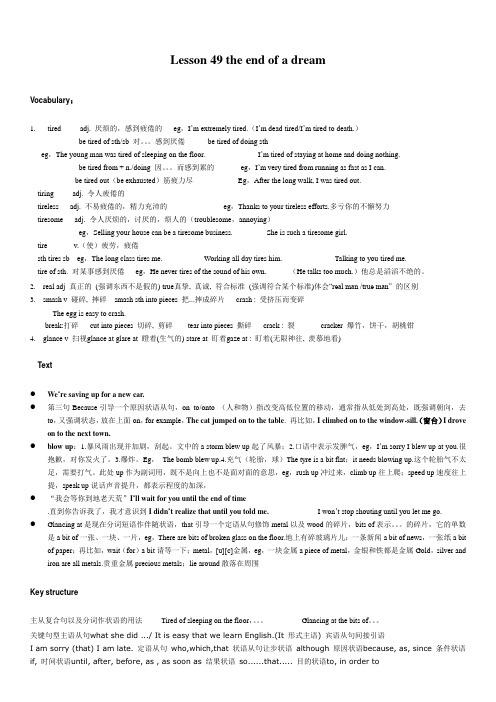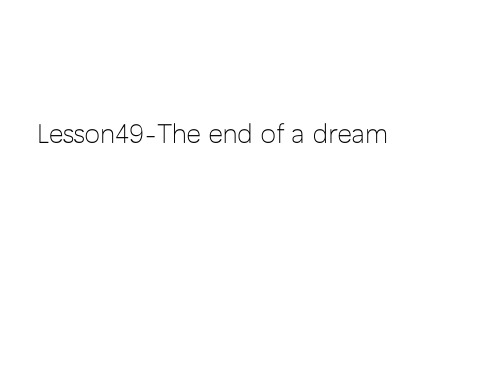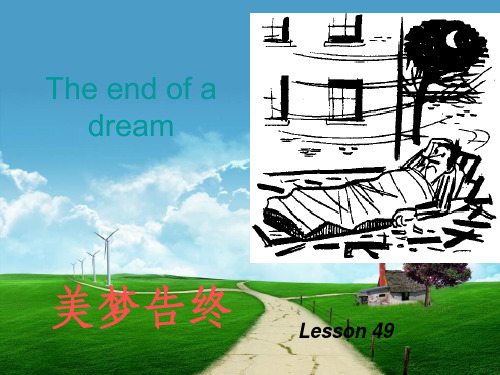新概念二册测试习题L49-72讲课讲稿
新概念二册测试习题L49-72

新概念第三单元测试题一找出划线部分读音与其他三个不同的选项。
1. A。
inch B. school C. teacher D. China2。
A。
matter B. glad C. glance D。
hat3。
A。
sea B。
eager C。
breath D。
eat4. A。
develop B。
possess C。
remove D。
recognize5。
A。
with B。
worthless C. thank D. think6. A. Christmas B。
church C。
teach D. child7。
A。
ought B。
bright C。
high D。
laugh8。
A。
lonely B。
go C. towards D. note9。
A. nearly B. appear C. bear D. hear10. A. taxi B。
fat C。
land D。
make二选出恰当的选项。
1.He ___ go to bed ___ I came back. A。
not, until B。
did, until C. didn’t, until D。
didn't ,when2.The young man helped the old man to ___ the bus 。
A。
go on B。
go off C. get on D. getto3.I don't know how ___ it. A。
to do B. do C. doing D。
to doing4.He is sitting ___ the classroom with his deskmate。
A. in front of B. in the front of C. in frontD。
in the front5.When I came into the room,he ___ on the bed。
A. lays B。
2019~学年高二英语新概念第二册lesson 49课件(共32张)教育精品.ppt.ppt

• 1.作业习惯: • 认真清晰书写,每周至少2次对好的书写模
板进行模仿;完型阅读等客观题注重细节, 圈划重点,联系上下文,找好文中的线索和 证据。
• 2.订正习惯: • 对于听写中未掌握的生词和词组等,下发后
马上订正,并且及时巩固;作业中的产生的 错误,如果老师没有讲解,自己也需抽时间 再次理解或询问老师。
1. Do you like to sleep on a hard bed or a soft bed? What is a soft bed made of? springs and a mattress
2. We can always see some small hammers on the buses. What would we do with them?
In my opinion, he was…, because/for…
In my opinion, he was determined, for he saved up for years to buy a real bed. …
He was determined, for he saved up for years to buy a real bed.
He was careless, for he did not pay attention to the weather since he slept on the roof of his house.
He was lucky, for although the bed was smashed to pieces, he was miraculously unhurt.
Working all day tires him.
新概念英语2第49课课件详细版

【课文讲解】
1. Tired of sleeping on the floor, a young man in Teheran saved up for years to buy a real bed.
• be tired of 对...感到厌倦,这里用形容词短语直接做原因 状语,相当于原因状语从句as he was tired of...sleeping 为动名词,作介词of的宾语。
I’m tired of staying at home and doing nothing.
我厌倦我的男朋友了. I am tired of my boyfriend. 我的妈妈厌倦和我爸爸吵架了 My mom was tired of quarrelling with my dad.
be tired from doing.. 因...感到累 be tired out 筋疲力尽
12.hurt V. (hurt hurt hurt ) 1) v. 伤 Have you hurt yourself? 2)v. 伤害感情 (尤指思想、心灵)
You hurt my heart. hurt one`s self-respect 伤害某人的自尊 3)adj. 受伤的 She is hurt. She is unhurt. I feel hurt . 我感到受了伤害. badly hurt 严重受伤的 13.promptly adv. 迅速地
6.gust n. 一阵狂风 • a gust of wind一阵风 注意区分: • breeze n. 微风
a gust of anger 一阵无名火
• gale n. 大风,(突发的)一阵风(风力比gust强)
(完整word版)新概念2_L49

Lesson 49 the end of a dreamVocabulary:1.tired adj. 厌烦的,感到疲倦的eg,I’m extremely tired.(I’m dead tired/I’m tired to death.)be tired of sth/sb 对。
感到厌倦be tired of doing stheg,The young man was tired of sleeping on the floor. I’m tired of staying at home and doing nothing.be tired from + n./doing 因。
而感到累的eg,I’m very tired from running as fast as I can.be tired out(be exhausted)筋疲力尽Eg,After the long walk, I was tired out.tiring adj. 令人疲倦的tireless adj. 不易疲倦的,精力充沛的eg,Thanks to your tireless efforts.多亏你的不懈努力tiresome adj. 令人厌烦的,讨厌的,烦人的(troublesome,annoying)eg,Selling your house can be a tiresome business. She is such a tiresome girl.tire v.(使)疲劳,疲倦sth tires sb eg,The long class tires me. Working all day tires him. Talking to you tired me.tire of sth. 对某事感到厌倦eg,He never tires of the sound of his own. (He talks too much.)他总是滔滔不绝的。
新概念英语第二册 lesson 49 课件

For the first time in his life, he became the proud owner of a bed which had springs and a mattress.
be proud of take pride in
A. when B. if C. because
D. though
3.None of us knew what had happened _________ they told us about it.
A. when B. until C. after
D. though
4.---I hope you'll enjoy your trip, dear! ---Thank you, mum. I’ll give you a call ___ I get there. A. until B. as soon as C. since D. till
I saved up for years to go abroad because I was tired of too much homework.
Being tired of too much homework, I saved up for years to go abroad.
For the first time in his life, he became the proud owner of a bed which had springs and a mattress.
3. Her work was to clean the rooms and ________ the floor.
新概念英语第二册lesson49完整ppt课件

美梦告终
Lesson 49
NEW WORDS AND EXPRESSIONS
1.Tire N&V • [v] (使)疲倦,疲劳 • Sth tires sb …使某人疲倦 • Eg: The long class tires me. • Working all day tires him.
by the wind. • A new broom sweeps clean.
精选ppt
• 8.★courtyard n. 院子 • court n. 院子,庭院;法庭 • yard n. 院子 • backyard n. 后院 • frontyard n. 前院
精选ppt
• 9.★smash v. 碰碎, 摔碎 • ① vt.&vi. 打碎,摔碎,(使)碎裂 • The cup smashed on the floor. • smash sth. into pieces 把……摔成碎片 • tear sth. into pieces 把……撕成碎片 • The bed was smashed to pieces. • The letter was torn to piece.
• 7.★sweep (swept[swept],swept) n. 扫刮
• ① vt. 扫,打扫 • 她每天早上都打扫地板/房间
• She sweeps the floor/the room every morning.
• ② vt. (风)吹;刮 席卷
• A huge wave swept over the deck。 • 一股巨浪从甲板上卷了过去 • sweep sth. away 把……刮走 • The newspaper has been swept away
新概念49--72复习课 2

新概念49--72课复习资料1.一般现在时的肯定,否定及疑问句之间的相互转换:eg:He likes steak.否定句:He doesn't like steak.疑问句:Does he like steak?变否定:在动词前面加don't./doesn't.变疑问:Do/Does提于句首,动词变原形。
2.动词单三形式的变化规则3.Where do you come from? come from=be fromeg:I come from England.What nationality are you? I am English.4.询问天气状况的句型:What's the weather like today?5.一般现在时中频度副词常放在主语之后,实意动词之前.6.国家,人名,月份,星期,专有名词前首字母大写。
7.Which season do you like best? I like spring.which特殊疑问词,对“哪一个”进行提问。
8. come home from school 放学回家come home from work 下班回家9.询问时间的句型及时间表达法:What's the time? It's+时间+o'clock10.一般现在时的含义,结构及肯定疑问句之间的相互转换:一般现在时,经常做的事结构:主语+动词+其他eg:Mrs Sawyer usually drinks tea in the living room.否定:Mrs Sawyer doesn't drink tea in the living room.疑问:Does Mrs Sawyer drink tea in the living room.11.注意区分一般现在时与现在进行时的区别:ps:根据时间状语来判断时态,注意动词单三形式的变化规则及动词现在分词的变化。
(完整word版)新概念第二册L49-L72测验(word文档良心出品)

New Concept EnglishⅡ(L49—L72)Translation (25’)扫视禁止严格的谜;神秘认出说服有信心的毫无价值的爆炸增加专家不耐烦地破坏(n.) 威胁钦佩欧洲的阻碍交通饶恕某人设法做成某事无论怎样坚持做某事没有察觉代替更糟糕的是要是我知道他的电话号码的话,我就会打电话给你了。
Fill in the blanks, using the proper forms. (15’)reward invent root rescue forbid hesitate wheel glance course punish connect erect insist burst average1 My father me to drive the car.2 I saw at a that she had been crying.3 He was given an electronic watch in for his services.4 Edison the electric light lamp.5 Carts, cars and trains run on .6 We should write between the lines in the of our reading.7 If you too long, you will miss the opportunity.8 He by his teacher because he was naughty.9 Trees often have deep .10 The road Nanjing and Shanghai.11 The firemen the woman from the burning house12 He that he heard some noise in the bar.13 All the people into laughter.14 He smokes ten cigarettes a day on an .15 The town a monument to the heroes in a few months.Cloze test (15’)Are we alone in the universe? Or is there 1 on Mars?Ever since people first 2 up into the night sky, there’s been a question that has bothered us all. From the smallest 3 to the world’s greatest astronomers, all have 4 , ‘Are we alone in the universe?’The question comes to me strongest at 5 , looking up at the stars and looking at all those little 6 of light and wondering ’This is galaxy full of life, or is this it?’It’s the question that societies often have been asking 7 the ages. We really just want to know how we got here. Why do we exist? Are we the8 signs of life?This 9 for life elsewhere in the universe is perhaps the greatest scientific question of all. But so far most efforts have 10 on just one planet.Searching for life is a difficult job. We’d like to be 11 to travel to all these worlds far away. Unfortunately, 12 of them are very good in terms of prospecting for biology(勘探生物). The best one is probably Mars. Mars is just 60 million kilometers away.Mars is important because it’s close by. It’s our 13 neighbour to the earth. And we’d like to see if life is there, because if we can find life in 14 places in our solar system, we know that life isn’t just on the earth. It’s much more 15 that life fully exists elsewhere. Perhaps in other solar systems, other parts of the universe.( ) 1. A animal B people C life D plant( ) 2. A jumped B looked C climbed D shouted ( ) 3. A astronomers B life C plants D children ( ) 4. A told B wondered C talked D laughed ( ) 5. A morning B noon C night D evening ( ) 6. A points B ants C space D water ( ) 7. A in B after C between D over ( ) 8. A best B only C whole D high ( ) 9. A thinking B speaking C learning D singing ( ) 10. A focused B got C come D gone ( ) 11. A happy B easy C free D able ( ) 12. A all B none C any D more ( ) 13. A farthest B nearest C shortest D smallest ( ) 14. A two B second C one D first ( ) 15. A possible B open C likely D easyReading comprehension (20’)AOnce a special test took place in Linhong Foreign Language School. Liu Ying was one of the luckiest students from the school. She was chosen to take part in the test.The next morning, she got up early for the test. On her way to the exam classroom, she noticed that there was lots of waste paper on the road. All the students must walk through the road, but no one picked it up.To her surprise, when she entered the classroom, she found that therewas nobody in it. Of course, there was no test. She felt very disappointed. When she came back home, she told her mother about the strange thing, Her mother smiled at her and said peacefully, ‘Oh, my dear! Please think it over!’ Liu Ying was puzzled. After a while, her mother said, ’In fact, you were all tested. This is a special test—a moral(道德的) test!’By then Liu Ying understood. She felt very shameful. Yes, she failed in the exam. She realized that protecting the environment was our duty. We should try our best to keep our school and our country cleaner and more beautiful.( ) 1. Where did the special test take place?A In Linhong Foreign Language SchoolB In Woodland SchoolC In No.14 Middle SchoolD In Changhai Middle School( ) 2. Who was one of the luckiest students in the schoo?A Xiao MingB LilyC Liu XiangD Liu Ying( ) 3. What did she notice on her way to the exam classroom?A There was a wallet on her way to the classroomB There was lots of waste paper on her way to the classroomC There was a rabbit on her way to the classroomD There was a pen on her way to the classroom( ) 4. What did she find when she entered the classroom?A There was only a teacher in the classroomB There was only a student in the classroomC There was nobody in the classroomD There were lots of students in the classroom( ) 5. What can we learn from the test?A Taking part in exams was very importantB Taking good care of ourselves was very importantC Caring only for our grades was very importantD Protecting the environment was our dutyBAt last, the mid-term exams are over. You have done the hard work, but you can’t relax. You have to prepare for the next exams. Do you hate exams? If you do, you’re not alone. Students in other countries hate them as well.Luckily, British students have fewer exams than Chinese students. And they only have them once a year. Every summer they take a test in each subject. Each test lasts about an hour. These exams don’t count for much. Even if a student does really badly, he can still progresses to the next year. When the results come out, they are then placed in an end-of-year report. The report is sent to the child’s parents. It describes how the student studied school.This report is private, so only the teacher, the student and his or herparents see it. This means that the students don’t know how other students scored in the test. Some students choose to tell each other, but others keep it secret.Parents’ meetings are held twice a year, at the end of the winter term and then at the end of the summer term. Children go along with their parents to meet their teachers privately and discuss their performance at school.( ) 1. According to this passage, the students of many countriesExams.A don’t mindB have toC hateD like( ) 2. Which of the following is NOT true for British students?A They have an exam once a yearB They don’t know their own scoresC Parents’ meeting are held at the end of the termsD They are allowed to tell each other their scores( ) 3. For British students, the school life is than that of Chinese students.A more relaxingB much tenserC more relaxedD much harder ( ) 4. The underlined phrase ’don’t count for much’means’’in ChineseA 难以计数B 不太重要C 期望不多D 数量不多( ) 5 Who will see the report of a student?A Only the student himself/herselfB Only the student’s parentsC Only the student’s teacherD All of the aboveFill in the blanks (10’)There was a special football team in South Africa. The team was made upof 35 women, aged of f 50 to 84. It was developed by a housewife five years ago to help old women keep f . The project was so successful that they had took p in the Veterans Cup Competition (元老杯足球联赛) in the USA.‘We are i to play in the Veterans Cup, where many grandmothers from all over the world come t and play football,’ said the team leader. Whatever happens, h , the grandmothers have no regrets. Most of them often play football in their aprons(围裙) after h .‘I suffered back pain and sore knees(腰酸腿疼) before j the team three years ago. Now I am fresh. I don’t feel any pain in my b , and I can run. At home I do all the housework by myself!’ said o of the grandmothers.Composition (15’)假设某中学生英文报开展关于青少年如何健康成长问题的讨论,请你根据下表所提示的信息,以How to grow up in a healthy way为题,用英语写一篇稿件,筒述青少年健康成长的必要条件和成长过程中存在的某些问题,并提出建议。
- 1、下载文档前请自行甄别文档内容的完整性,平台不提供额外的编辑、内容补充、找答案等附加服务。
- 2、"仅部分预览"的文档,不可在线预览部分如存在完整性等问题,可反馈申请退款(可完整预览的文档不适用该条件!)。
- 3、如文档侵犯您的权益,请联系客服反馈,我们会尽快为您处理(人工客服工作时间:9:00-18:30)。
新概念第三单元测试题一找出划线部分读音与其他三个不同的选项。
1. A. inch B. school C. teacher D. China2. A. matter B. glad C. glance D. hat3. A. sea B. eager C. breath D. eat4. A. develop B. possess C. remove D. recognize5. A. with B. worthless C. thank D. think6. A. Christmas B. church C. teach D. child7. A. ought B. bright C. high D. laugh8. A. lonely B. go C. towards D. note9. A. nearly B. appear C. bear D. hear10. A. taxi B. fat C. land D. make二选出恰当的选项。
1.He ___ go to bed ___ I came back. A. not, until B. did, until C. didn’t, until D. didn’t , when2.The young man helped the old man to ___ the bus . A. go on B. go off C. get on D. get to3.I don’t know how ___ it. A. to do B. do C. doing D. to doing4.He is sitting ___ the classroom with his deskmate. A. in front of B. in the front of C. in frontD. in the front5.When I came into the room, he ___ on the bed. A. lays B. lies C. was laying D. was lying6.I threw the ball ___ him and he caught it. A. at B. to C. for D. on7.You can ___ your hand if you want to answer this question. A. rise B. raise C. rose D. raised8.Be careful of the ___ glass, or you’ll hurt your fingers. A. break B. breaking C. broke D. broken9.Sorry, but ___ of us can speak French. A. a little B. little C. a few D. few10.During the exam no one is allowed to ask ___ questions. A. some B. any C. each D. all11.Doctors should work hard to save ___ sick and wounded. A. a B. some C. the D. /12.I ___ no mistakes in my work so far. A. had made B. have made C. will make D. was making13.Our room is ___ yours. A. as bigger as B. as big as C. so bigger as D. so big as14.The ___ boy is his son. A. beautifully B. looking C. handsome D. well15.He said he would go and see his parents the ___ day. A. follow B. follows C. followedD. following16.He enjoyed ___ at the party last night. A. his B. him C. himself D. he17.His mother made him ___ his hands again. A. wash B. washes C. to wash D. washing18.The boy ___ blue shirt is my brother. A. on B. in C. with D. dress19.It was here ___ I met her yesterday. A. where B. which C. that D. on which20.There is something wrong with my watch. I’ll have it ___ tomorrow. A. repair B. repairedC. repairingD. to be repaired21.He got up early ___ he might catch the first bus. A. so B. so that C. so to D. in order to22.I spend my spare time ___. A. read B. to read C. reading D. to reading23.He saved the baby ___ the cost of his life. A. on B. at C. for D. with24.I saw him ___ an apple in the street. A. ate B. eating C. to eat D. to eating25.If I ___ you, I would study hard. A. am B. be C. were D. being26.They were ___ watching TV. A. interesting in B. interested for C. interested inD. interesting for27.This book is worth ___. A. to read B. to reading C. read D. reading28.This is our classroom . Don’t let the stranger ___. A. in B. out C. off D. down29.Is his grandfather ___? A. living B. live C. alive D. lives30.Would you mind ___ opening the window? A. I B. my C. me D. mine31.The students in our school are told ___ football on the playground. A. don’t play B. not to playC. to not playD. aren’t play32.Did you see the girl go out? No, because I ___ TV. A. had watched B. have watchedC. was watchingD. am watching33.Our teacher said yesterday that the sun ___ in the east. A. rose B. rises C. rising D. was rising34.If it ___ tomorrow, we’ll stay at home. A. rain B. rains C. will rain D. will be rained35.Don’t hurry! There is still ___ minutes left. A. few B. a few C. little D. a little选择与句中划线部分意思相同或相近的词或短语。
36. We got to the cinema late because of the busy traffic. A. large B. light C. heavy D big37. Look out, David! A car is coming. A. Be careful B. Look outside C. Look around D. Look back38. Please remember me to your family when you get back home. I miss your parents very much.A. show welcome toB. say good-bye toC. say hello to D write to39.Tom’s temperature seems to be all right. A. OK B. well C. serious D. better40. Tom is weak in English. A. doesn’t like B. is not interested in C. is not good at D. feels weak 三用所给词的正确形式填空。
1.Can you tell me what ___ (do) next?2.I hate ___ (wash) clothes.3.He came here three years ago. Now he is used to ___ (live) here.4.At last, his dream came ___ (truth).5.We ___ (failure) to persuade him yesterday.6.He had his hair ___ (cut) yesterday.7.Sports can ___ (development) mind and body.8.If you ___ (pressure) this button, the machine will start.9.Her mother told her not to be ___ (patient).10.Her ___ (faulty) is that she talks too much.11.He is the most ___ (activity) person in our class.12.He ___ (be) a student for six years.13.I found it ___ (beauty) and bought it.14.Your coat is dirty. It needs ___ (wash).15.He sat there without ___ (say) a word.四用适当的介词或副词填空。
